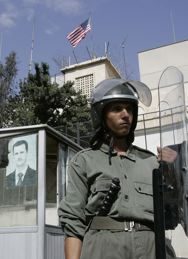
Embassy officials increased security and closed the facility to the public, although the demonstrators were not in the immediate vicinity of the embassy. Agence France Presse reported that demonstrators, including civil servants and students, assembled in the city center, and waved Syrian flags and pictures of President Bashar al-Assad, chanting: “Colonialists, listen, the people of Syria will never be brought to their knees.”
Some demonstrators wave banners reading: "No to American terrorism" and "American democracy — the killing of civilians at Abu Kamal," the area targeted in Sunday’s U.S. raid.
"I want to denounce this act of American terrrorism. We are going to liberate Palestine, and Syria will liberate its occupied land," a Palestinian woman named Shaimaa was quoted by AFP.
The incident triggering the protests, according to Syrian sources, was a U.S. helicopter raid near Abu Kamal, five miles from the Iraqi border. Sana, Syria’s official news agency, claims the raid resulted in the deaths of eight people. A U.S. official in Washington said that the operation had targeted a top militant who smuggled arms and fighters into Iraq. However, the State Department and Pentagon have made no official comment.
BBC correspondent Paul Wood visited a Syrian hospital near the area described as the scene of the U.S. attack and spoke with a woman who lost her husband and four sons. "I went outside to get my son and the Americans shot me," she told Wood. "I was screaming in terror." The woman said the men were working on the house that was in the compound where the Americans landed. She denied there was any link between them and al-Qaeda.
However, unnamed U.S. officials said the raiders killed Iraqi Abu Ghadiya, who was a former lieutenant of Abu Musab al-Zarqawi, an al-Qaeda leader in Iraq who was killed in 2006.
Iraqi government spokesman Ali al-Dabbagh challenged the legitimacy of the raid in an October 28 statement: “The Iraqi government rejects the US helicopter strike on Syrian territory, considering that Iraq’s constitution does not allow its land to be a base for launching attacks on neighboring countries.”
Reuters news service on October 29 cited Syrian Deputy Foreign Minister Fayssal al-Mekdad, who said Syria was waiting for an official explanation from Washington and Baghdad about "the unacceptable violation of Syrian sovereignty" before taking any more measures.
As the United States and Iraq are in the process of negotiating a security agreement to govern the U.S. presence in Iraq after the UN mandate expires at the end of 2008, Iraqi national security adviser Mowaffak al-Rubaie said the new security pact would prevent the U.S. military from launching attacks from Iraq on neighboring countries.
"There is a very clear article in the SOFA (Status of Forces Agreement) draft that says the U.S. cannot, should not, launch any operation from Iraqi soil against other countries," Rubaie said on October 29.
In response to the U.S. raid, members of the Jordanian parliament issued a statement demanded the international community take measures to stop such military operations, which they said help "entrench violence and hatred" in the region.
AP Images



